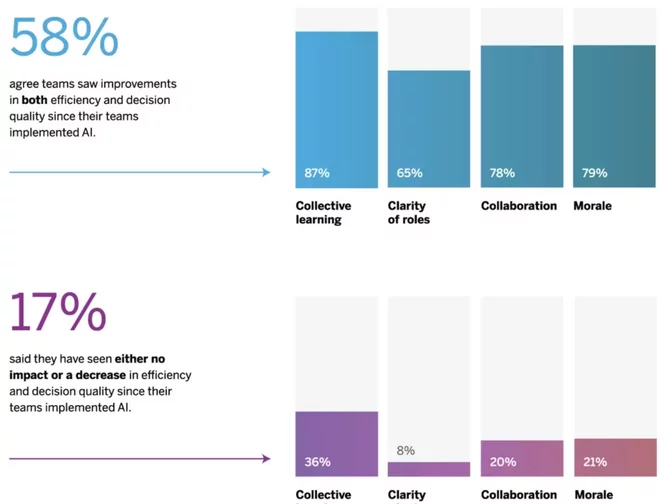Report: AI can strengthen team culture and collaboration

Nearly 80% of managers report that their adoption of artificial intelligence has improved their team’s team morale (79%), collaboration (78%), decision-making and efficiency (75%), according to a just-released global study from MIT Sloan Management Review and Boston Consulting Group.
Research finds that with the implementation of AI, most executives report not just the obvious improvements of efficiency and decision-making, but further team benefits on the cultural level too.
AI-related cultural and financial benefits build on each other
Research finds that using AI helps companies reassess what it means to be effective and this leads to new business objectives, which subsequently leads to new ways to measure performance, new behaviours, and improved outcomes.
The report finds that those who see significant financial benefits with their AI initiatives are 10 times more likely to change how they measure success as a result of using AI than those who see no such benefits.
And therefore, more than half (64%) of enterprises that use AI go on to change how they measure performance and adjust their KPIs. When AI enables workers to outperform existing KPIs, new success measures are necessary. Subsequently, 66% of respondents who agree that their KPIs have changed because of AI have also witnessed improvements in team-level collaboration.
According to Sam Ransbotham, a professor at the Carroll School of Management at Boston College and the report co-author, “those who do obtain significant financial benefits often have learned how to culturally benefit from AI and how to use AI to glean financial rewards.

Innovating with AI improves competitiveness
Using AI can improve enterprise competitiveness, with research finding that of the companies using AI to explore new ways to create value – versus to improve existing processes, 59% find using AI helps them to defend against competitors and capture opportunities from complementary industries.
Successful organisations have moved beyond using AI just to improve their current business and processes. “They are now harnessing the power of AI to uncover new business opportunities to create competitive advantage,” says Francois Candelon, MD at BCG.
Mistrust of AI can undermine adoption
However, for the benefits of AI – both financial and non-financial – to materialise will depend on employees working with and trusting the technology. Such mistrust of AI stems from a lack of understanding on how AI works (49%) or training (46%), while providing too little context (34%) or too much information (17%) on AI decisions can erode trust.
“Cultural acceptance of AI begins with trust,” says David Kiron, editorial director at MIT SMR and report co-author. “Building that trust depends on teaching and training workers, explaining the reasons for AI recommendations, and providing AI tools that solve problems.”
The report recommends that given how effective AI has proved to be at the team and cultural levels, leaders should find ways to translate that more broadly to the enterprise level, and further use AI as a managerial tool to align micro behaviour with broader goals, including societal purpose, equity and inclusivity.






